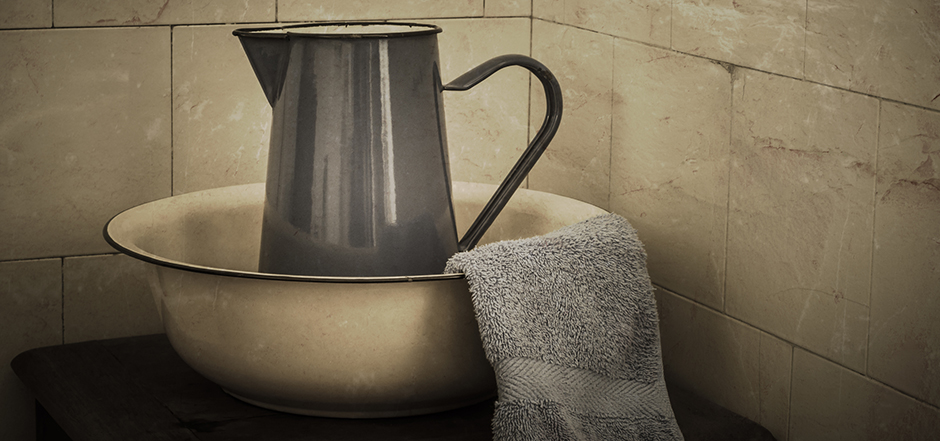A Holy Invitation
Holy Week is invasive. It’s meant to be. It’s meant to take away all our defenses against our God, who comes to us in ways that we, because we are his disciples, cannot resist.
But that’s what we see in the Gospel of John. I feel it in me as I prepare for Holy Week.
There has to be a kind of inner shift, because I have to be ready for God to come into places I would rather keep at a distance. Because you see, it is possible to live our lives and even practice our Christianity in a way that is actually a defense against the love of God rather than an expression of our hunger for him. Let’s examine this through the familiar Lenten story of Jesus washing the disciples’ feet, John 13:1-17.
‘You Will Never Wash My Feet’
There’s something that happens with people who want to be your friend but keep you at a distance. They tell you things, perhaps even intimate things–but not the deepest, most intimate things. They gain your confidence without letting you come close, because the deep things have yet to be shared. What they say feels like an invitation, but you are being deceived. They’re really just drawing you in so they can receive your attention, not be a friend.
That’s how I treat God sometimes. I practice my devotions, I offer my prayers, but I still want to protect some places in my heart from this profoundly boundary-breaking, invasive love. And I know that today, in this season of Lent, this is where it stops, or at least recedes.
You see, Jesus has the secret weapon in his call. He sees the defenses, and He comes anyway, because He knows that behind the defense is the cry in our heart for him. And he knows it’s there because in fact, he’s the one who placed it there, “Before you were in the womb I knew you and called you” (see Jer. 1:5). That is the deep longing within us that has been placed by the sovereign hand of God, the deepest cry of our hearts—not for rebellion, but to finally be found.
And so Jesus, hearing our “Oh, do not wash my feet” protests, presses in anyway, because he sees something behind the defense that is calling him to us. And what he sees is his call, the one he has placed there.
‘Not My Feet Only’
So a part of me is both afraid and relieved that my rebellion does not win. Because what happens? Jesus comes with great authority, knowing he has come from God and is going to God. A quote from Severian, a fourth-century Syrian church leader and preacher, describes perfectly what is happening in these verses: “He who wraps the heavens in clouds wrapped round himself a towel. He who forged water into rivers tips water into a basin. He before whom every knee bends, in heaven and earth and under the earth, kneels to wash the feet.”
This is the man who would eventually come to oppose John Chrysostum and have him condemned. It is possible, you see, to get some things right but others completely wrong.
And I quote Severian because that could be me—except somehow, by an act of mercy that is stronger than my will, God looks past even the rightness of my theology that keeps me at a distance from Jesus and calls me to himself. He pours out water on my feet, touching the in-between places in my toes that I don’t want anybody to touch. Talk about invasive!
And even when we partake of the Eucharist, do we understand what is being asked of us and offered to us? We come in, the bread of life is placed in these soiled hands of ours and we literally ingest into the very depths of our own digestive system, body and soul, the very presence of Jesus himself, received as we partake of bread and wine. If you’ve got boundary problems with God, you lose.
‘But Also My Hands and My Head’
Thank God, you lose. Like Peter, I want to lose: “Lord, not my feet only but also my hands and my head!” (John 13:9). There is a cry there for a completion of something God has placed within us, this restlessness, this knowing that not all things are right.
C.H. Dodge, in his commentary on John, makes a point that struck me. He said the whole first part of the gospel of John is Jesus in the world, and the key terms are life and light. It’s evangelistic: “I am the light of the world.” But come chapter 13, and the end of the Gospel, light and life recede. They key term now is love. “Having loved his own … he loved them to the end” (John 13:1b).
And it is into that love that we are, in fact, taken. Taken. That in so receiving that love, we might stand as people who proclaim light. And proclaim life.
So this is an invitation. An invitation to begin to put feet and walk toward the One who offers bread and wine, who washes feet. To say yes to the cry that is within and to try, by his mercy, to set aside our defenses against the very One for whom we long, that we might be healed, and be his in the world.
How has God broken down your defenses? Share this blog and your response on Twitter. Please include my username, @revgregbrewer.
(This post is an adaption of Bishop Brewer’s sermon on April 13, 2017, in the Bishop’s Oratory of the Diocesan Office, Orlando.)
Unless otherwise noted, Scripture quotations are from the New Revised Standard Version Bible, copyright © 1989 the Division of Christian Education of the National Council of the Churches of Christ in the United States of America. Used by permission. All rights reserved.

